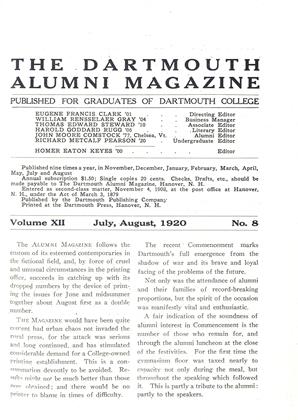Early on Wednesday morning, June 16, Henry E. Maroney '20 of West Medford, Mass. was shot and instantly killed by R. T. Meads '21 of La Grange, Ill. Numerous contradictory reports as to the circumstances of the tragedy were in circulation, but the fact was soon established that it was the result of an altercation over the price and possession of a bottle of liquor. The shooting took place in the Theta Delta Chi House, where Maroney was rooming, following an argument in Meads' room in North Massachusetts Hall. Meads is stated previously to have fired at Maroney and his companions as they ran from his room, snatching a bottle as they went. He followed them shortly after and went to Maroney's room, where, so far as has been learned, there was no conversation before the fatal shot was fired. Holding off pursuers with his revolver, Meads left the house and walked to the Mascoma station in Lebanon, where he caught the early morning train for Boston. He was arrested at Canaan and returned to Hanover that afternoon, where a hearing was held before Judge Burton. He waived examination and was committed to the County Jail in Woodsville to await action at the September session of the Grand Jury.
Maroney prepared for Dartmouth at Phillips Andover Academy. He was particularly active in the Dramatic Association throughout his course, serving as president during his senior year. He was a member of Theta Delta Chi and Sphinx. He was one of of the first students in the College to enlist on the outbreak of war, being inducted into the United States Naval Reserves on April 11, 1917 and stationed successively in South America, Panama and France. He was commissioned ensign in July, 1918.
Although it seems to be established that Maroney had been drinking on the night of the shooting, it does not appear that he was intoxicated. After a period of separation from College he had been readmitted on a promise that he would entirely abstain from liquor during the rest of his course, and this pledge seems to have been kept to the letter according to his understanding of it. He had just completed his final examinations the afternoon before the shooting.
Meads also saw service in the war as an ensign, being stationed in Florida with the branch of naval aviation.
A statement made by President Hopkins relative to the tragedy follows:
"I have had no intention of making anypublic statement concerning the tragedy of Wednesday morning in Hanover unless it should have been necessary to make one to protect the name of an attractive boy of ability and worth whose sad death has made it incumbent upon others to speak for him. In this connection perhaps the most significant thing that I can say is that his degree has been earned and that next week the diploma symbolic of that fact will be forwarded to his parents. We have no purpose of suppressing, nor intention of influencing publicity, upon a matter necessarily of wide public interest.
"In order that the statement of facts shall not be misinterpreted, however, and in recognition of responsibility to the College collectively and to hundreds of fine boys individually, I wish unqualifiedly to deny that there has been any general system of smuggling in of liquor to Hanover and to say that the College authorities by every device available have kept watch of the situation and checked every known source of supply. To this end officers of the law and the college disciplinary machinery alike have worked. I hesitate, however, to make even this statement lest its implications do injustice to practically all of the undergraduate body, the strength of character and high purpose of whom put them entirely outside of consideration in this matter.
"The facts of this sorrowful event are wholly extraneous to college life here or elsewhere. Even with the educational processes and the moral influences of the College far more effective than they are, it could not be sure of the inevitable transmission of its group influence to all men. Among the exceptions there will always be men potentially dangerous to the welfare and reputation of the group as a' whole, however carefully the selective processes of the College are operated or however insistently the moral code is imposed. The circumstances of this event must stand, and for many of us there can be little thought except on the one hand of the promising boy who lies dead, the victim of conditions outside of reckoning, or on the other hand of the boy and his one or two accomplices whose goal was cleverness. In spite of the contrast with this picture the background still remains nevertheless a devoted sense of purpose on the part of hundreds of college men and a fundamental stress on the values of righteousness in all of the motives of the College officially."
 View Full Issue
View Full Issue
More From This Issue
-
 Article
ArticleCOMMENCEMENT 1920
July 1920 By PHILIP SANFORD MARDEN '94 -
 Article
ArticleGEORGE P. MARSH, 1820
July 1920 By JOHN COTTON DANA '78 -
 Article
ArticleABSTRACT OF MEETING OF TRUSTEES, JUNE 21, 1920
July 1920 -
 Class Notes
Class NotesCLASS OF 1900
July 1920 -
 Article
ArticleDARTMOUTH OF THE FUTURE
July 1920 By HOMER EATON KEYES '00 -
 Article
ArticleBASEBALL
July 1920








